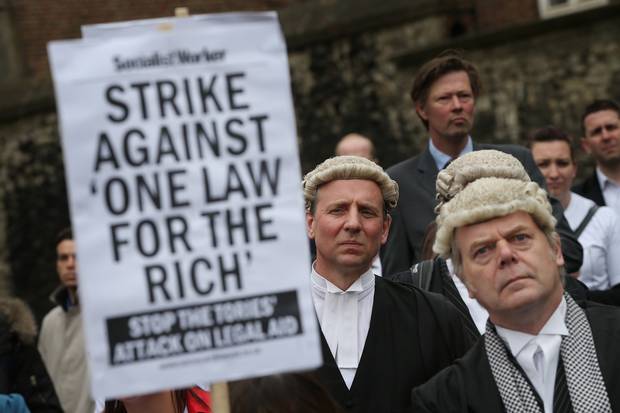Legal Aid: The Price of Justice
Image Source: http://converseprisonnews.com/
– Michael Keightley (LLB Law, Newcastle University) m.keightley@hotmail.co.uk
Substantial cuts made to the welfare system in April 2013 have been met with public outrage. In order to save an approximate £350m per-year, legal aid has been scrapped entirely for cases of divorce, welfare benefit disputes, child contact, clinical negligence and employment.
Further changes are restrictions in housing law, with legal aid only being allowed in extreme circumstances. Not to mention the ethically questionable decision that, in order to receive legal aid in cases of domestic violence, the victim is required to provide medical evidence. Alongside all of these changes, employment tribunals will now cost a minimum of £160 before you even attend the hearing and could result in a total cost of £1,200 for ‘complex’ cases, based around issues such as unfair dismissal or discrimination.
Consider the amount of people using the legal aid system in 2009/2010 (an approximate 2,965,000) and compare that to the Government’s aim to save £350m. From this we can see that the Government would save a mere £118.04 per-head – leaving almost 3million people without proper access to justice for a relatively low reward.
Are we not living in a society of equal treatment? Not to say the legal system has been altered. The intentions of the legal system, as a whole, remain to be fair and indiscriminative. The issue is the accessibility of a fair system. It becomes difficult to profess that a system is fair if all cannot properly access it. Attorney General Dominic Grieve argues that “everyone has a reasoned plan for why expenditure should not be cut from their area”, but this does not concern the legal system as a single area, it concerns the constitutional right of every individual’s access to justice.
These changes adversely affect those on low-incomes by not allowing help with the legal support that can ensure they treated rightfully. Take, for example, if someone on a low income were unfairly dismissed for their race or belief; they would be left with no income and no means to follow the issue up in an employment tribunal. This loss of income could branch out into issues with rent, claiming Jobseekers or obtaining future employment.
This need for assistance will then shift to private charities, such as The Citizen’s Advice Bureau, and people will be forced to face their issues with the limited assistance of these charities, or their own knowledge of the system. An even worse possibility is that they may feel forced into finding funding for legal representation elsewhere, which could be bank loans or high-interest payday loans.
But this extends beyond financial issues. When domestic violence victims are doubted through the need to submit medical evidence of their victimisation, it becomes an ethical issue. Breaking ethical boundaries like this could create a rift of mistrust between the people and the system they rely on to deliver justice.
For the legal system itself, lawyers could lose a significant amount of clients. With the area of criminal law having 1,358,000 acts of assistance funded by legal aid, criminal lawyers are also bound to suffer. Grieve also commented upon this issue, giving his sympathy for the lawyers that were to be affected, stating, “for self-employed people it is death by a thousand cuts and it’s an extremely painful process”. It is this issue of ‘self-employment’ that seems to be receiving such little consideration – it would seem nonsensical to stop people entering a local shop and buying groceries due to a choice based on their financial income, so it should be regarded as equally unfair that the government are forcing a restriction to the business of many self-employed lawyers.
It is difficult to draw a positive from these cuts. With adverse effects to the idea of ‘justice’ and people’s belief in the system under which they are ruled, it would be more relevant to refer to a Marxist approach, where the classes are being treated differently based on their income. Such a huge change that was rallied against by 96,000 people through an e-petition; the conclusion left to draw is that such budget cuts have shackled the concept of justice and limited people’s utilization of their rights.
